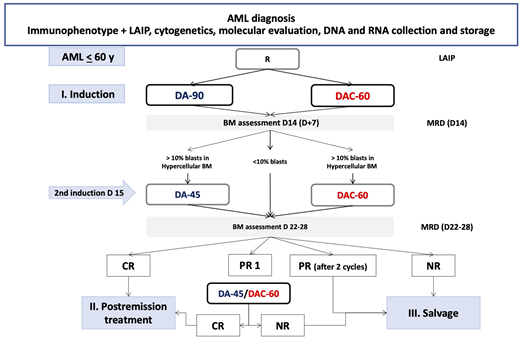Background: AML is the most common acute leukemia in adults. While most adults < 60 years achieve complete remission (CR) with intensive induction chemotherapy, approximately one third have primary refractory disease and, overall, the majority of AML patients still relapse despite having attained initial remission (Dohner et al, Blood 2017). The combination of an anthracycline and cytarabine has been the mainstay of intensive AML induction for more than 50 years. Combined with cytarabine (AraC), high-dose daunorubicin (90 mg/m2) in induction (DA-90) resulted in a higher rate of CR (70.6% vs. 57.3%, P<0.001) and improved overall survival (OS) (median 23.7 vs. 15.7 months; P = 0.003), without increased serious adverse events compared with DA-45 (Fernandez et al, NEJM, 2009). In two PALG randomized trials, the combination of cladribine with DA (DAC regimen) also resulted in significantly increased CR after a single induction course, compared with the standard two-drug induction (DA-60) (Holowiecki et al, Leukemia, 2004 and JCO 2012). Both regimens have a recommendation from the National Cancer Comprehensive Network (NCCN) for routine use. For patients with primary refractory disease, the commonly used FLAG-IDA (fludarabine, cytarabine, idarubicin, GCSF) regimen results in a CR rate of 52% (Pastore et al, Ann Hem, 2003). Two previous PALG studies confirmed that another standard regimen, CLAG-M (a combination of cladribine, Ara-C, G-CSF and mitoxantrone) is also effective with tolerable toxicity in refractory/relapsed AML patients (Robak et al Leuk Lymph, 2000; Wrzesień-Kuś et al, Eur J Haematol 2003; Wrzesień-Kuś et al, Ann Hematol, 2005; Wierzbowska et al, Eur J Haematol ,2008; Jaglal et al, Leuk Res, 2014).
PALG-AML1/2016 aims to compare the safety and efficacy of two commonly used induction and salvage regimens in AML. This trial is also the first international randomized trial in AML induction to prospectively evaluate the impact of measurable residual disease (MRD) on overall survival, using multi-modality testing (flow-cytometry, next-generation sequencing, and PCR) of serial samples. The study is conducted in accordance with the principles of the "Declaration of Helsinki".
Study Design and Methods: PALG-AML1/2016 is a multicenter, randomized, Phase III study which will include 582 patients with newly-diagnosed AML treated at multiple centers across Poland and at Weill Cornell Medicine and The New York Presbyterian Hospital in New York City. This will allow a 10% difference in CR rate between the DAC and DA-90 induction regimens to be confirmed with a power of 80% and level of significance 0.05. Eligible patients must be 18 to 60 years of age with untreated AML, Eastern Cooperative Oncology Group performance status 0-2 and HCT-CI Index of comorbidities, ≤ 3. As midostaurin treatment has become approved and available the study was amended with an exclusion of FLT3-mutated patients. The trial schema is shown in Figure 1. The trial was initiated in July 2017 and 279 patients have been enrolled to date and accrual is ongoing. Preliminary safety and efficacy data were reviewed by the data safety monitoring committee after 194 patients and the recommendation was to proceed without changes. Serial samples for MRD are being collected from all patients at multiple time points and analysis is ongoing.
ClinicalTrials.gov Identifier: NCT03257241
Wierzbowska:Janssen: Honoraria; Celgen/BMS: Honoraria; Novartis: Honoraria; Abbvie: Honoraria, Membership on an entity's Board of Directors or advisory committees; Jazz: Honoraria, Research Funding. Pluta:Angelini: Research Funding; Celgene/BMS: Honoraria. Libura:Novartis: Honoraria. Wrobel:Janssen-Cilag: Honoraria, Research Funding, Speakers Bureau. Zaucha:Abbvie: Honoraria; Sandoz: Consultancy, Honoraria; Cellgene: Other: travel, accomodations, expenses; Novartis: Consultancy; BMS: Consultancy; Takeda: Consultancy, Honoraria, Other: travel, accomodations, expenses; Roche: Consultancy, Honoraria, Other: travel, accomodations, expenses. Robak:AstraZeneca: Honoraria, Research Funding; Janssen: Consultancy, Honoraria, Other: TRAVEL, ACCOMMODATIONS, EXPENSES (paid by any for-profit health care company), Research Funding; GSK: Research Funding; Bristol Meyers Squibb: Research Funding; Novartis: Honoraria, Research Funding; Morphosys: Research Funding; UCB: Honoraria, Research Funding; Roche: Consultancy, Other: TRAVEL, ACCOMMODATIONS, EXPENSES (paid by any for-profit health care company), Research Funding; UTX-TGR: Research Funding; BioGene: Honoraria, Research Funding; Acerta: Research Funding; Momenta: Consultancy; Pfizer: Research Funding; Sandoz: Consultancy, Honoraria; Octapharma: Honoraria; AbbVie: Consultancy, Honoraria, Other: TRAVEL, ACCOMMODATIONS, EXPENSES (paid by any for-profit health care company), Research Funding; Pharmacyclics LLC, an AbbVie Company: Honoraria, Research Funding; Medical University of Lodz: Current Employment; Takeda: Consultancy. Lee:BMS: Consultancy; Helsinn: Other: Member -DSMB; AstraZeneca: Consultancy; Jazz: Consultancy; Roche Molecular Systems: Consultancy. Ritchie:Novartis: Honoraria; Incyte: Speakers Bureau; Sierra Oncology: Honoraria; Abbvie: Honoraria; Pfizer: Honoraria, Research Funding; Jazz pharmaceuticals: Honoraria, Research Funding. Guzman:Cellectis: Research Funding; SeqRx: Honoraria. Roboz:Agios: Consultancy; Amphivena: Consultancy; Astex: Consultancy; Pfizer: Consultancy; Abbvie: Consultancy; Array BioPharma: Consultancy; Bayer: Consultancy; Celltrion: Consultancy; Eisai: Consultancy; Jazz: Consultancy; Roche/Genentech: Consultancy; Sandoz: Consultancy; Actinium: Consultancy; Argenx: Consultancy; Astellas: Consultancy; Daiichi Sankyo: Consultancy; AstraZeneca: Consultancy; Orsenix: Consultancy; Otsuka: Consultancy; Takeda: Consultancy; Trovagene: Consultancy; Cellectis: Research Funding; Jasper Therapeutics: Consultancy; Epizyme: Consultancy; Helsinn: Consultancy; MEI Pharma: Consultancy; Celgene: Consultancy; Janssen: Consultancy; Novartis: Consultancy.
cladribine - in induction regimen in AML
Author notes
Asterisk with author names denotes non-ASH members.


This feature is available to Subscribers Only
Sign In or Create an Account Close Modal